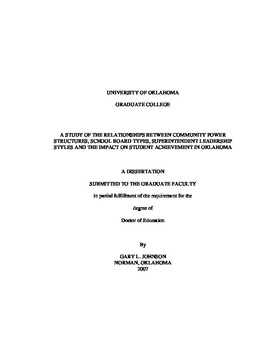| dc.contributor.advisor | Garn, Gregg, | en_US |
| dc.contributor.author | Johnson, Gary L. | en_US |
| dc.date.accessioned | 2013-08-16T12:20:41Z | |
| dc.date.available | 2013-08-16T12:20:41Z | |
| dc.date.issued | 2007 | en_US |
| dc.identifier.uri | https://hdl.handle.net/11244/1203 | |
| dc.description.abstract | This study was designed to examine the degree to which relationships of community power structures, school board behavior types and superintendent leadership styles exist in Oklahoma public schools. The study also explored the impact these relationships have on superintendent tenure and student achievement in Oklahoma. The study is based on the 1971 research of McCarty and Ramsey, with follow up studies by Hess (1994), Smith (1998) and Lere (2004). The study is a descriptive inferential study using the results of surveys mailed to all public school superintendents and school board presidents in Oklahoma. The questionnaire was originally designed by Hess in 1994 for use in Wisconsin and modified by Smith in 1998 for use in North Carolina. The survey sought to determine if the four theoretical categories of community power structures, school board types and superintendent leadership styles exist in Oklahoma school districts and the impact they have on student achievement. In addition, selected economic, social, political and demographic variables were examined along with district API scores for possible affects on the relationship types and student achievement. | en_US |
| dc.description.abstract | There was a good (53%) return from the superintendents, but a little weaker (24%) return rate by the school board presidents. The return rate of paired districts (92, 17%) allows some limited inferred predictions. From the paired responses the prediction can be made that relationship types and demographics have some impact on student achievement in Oklahoma. It can also be assumed that the combination of the two will likewise have an impact on student achievement. The data revealed evidence that all categories of community power structures, school board types and superintendent leadership styles existed in Oklahoma school districts. This follows and supports prior research indicating a substantial relationship exists between leadership and student achievement. It was also observed that demographics have an impact on the relationship between superintendents and school boards as well as an impact on student achievement. Also discussed are the implications for a need of staff development programs for superintendents and school board presidents and possible need for future studies. | en_US |
| dc.format.extent | xi, 173 leaves : | en_US |
| dc.subject | School board presidents Oklahoma Attitudes. | en_US |
| dc.subject | School board-superintendent relationships Oklahoma Public opinion. | en_US |
| dc.subject | Education, Administration. | en_US |
| dc.subject | Academic achievement Oklahoma. | en_US |
| dc.subject | School superintendents Oklahoma Attitudes. | en_US |
| dc.subject | Community and school Oklahoma Public opinion. | en_US |
| dc.subject | Community and school Oklahoma. | en_US |
| dc.subject | Public opinion Oklahoma. | en_US |
| dc.subject | School board-superintendent relationships Oklahoma. | en_US |
| dc.subject | Power (Social sciences) | en_US |
| dc.subject | School superintendents Professional relationships Oklahoma. | en_US |
| dc.subject | School superintendents Oklahoma. | en_US |
| dc.title | A study of the relationships between community power structures, school board types, superintendent leadership styles and the impact on student achievement in Oklahoma. | en_US |
| dc.type | Thesis | en_US |
| dc.thesis.degree | Ed.D. | en_US |
| dc.thesis.degreeDiscipline | Department of Educational Leadership and Policy Studies | en_US |
| dc.note | Source: Dissertation Abstracts International, Volume: 68-04, Section: A, page: 1251. | en_US |
| dc.note | Adviser: Gregg Garn. | en_US |
| ou.identifier | (UMI)AAI3263430 | en_US |
| ou.group | Jeannine Rainbolt College of Education::Department of Educational Leadership and Policy Studies | |
